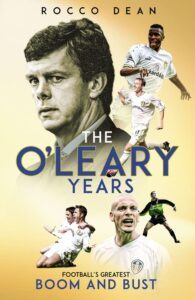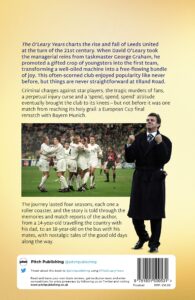Book Review: League One Leeds – A Journey Through The Abyss by Rocco Dean
 I first visited Leeds United’s Elland Road home on 19 September 1970 when they hosted Southampton. A rite of passage allowing me to witness the most successful Leeds side to grace the LS11 turf. An overcast autumn Saturday seeing a John Giles penalty claim both points (spoils for a victory back then) for Don Revie’s warriors in white.
I first visited Leeds United’s Elland Road home on 19 September 1970 when they hosted Southampton. A rite of passage allowing me to witness the most successful Leeds side to grace the LS11 turf. An overcast autumn Saturday seeing a John Giles penalty claim both points (spoils for a victory back then) for Don Revie’s warriors in white.
Talking of points, during that decade entertainer Bruce Forsyth spent Saturday evenings advocating (via catchphrase) “Points wins prizes.” Although Leeds managed to lift the Division One trophy twice in that era, too often they just failed to accumulate enough points to prevail as champions in English club football’s foremost league.
Instead, Jim Bowen’s 1970s gameshow catchphrase of “Have a look at what you could have won.” was too often written on Leeds United’s end of season report card… Oh, and do not get me started on that era’s domestic and European cup finals, times witnessing the club play bridesmaid on more occasions than a Nolan sister.
In a further reference to points, the fifteen deducted from the club for entering administration (in 2007) play a major part in the initial chapter of Rocco Dean’s skilfully documented and absorbing book League One Leeds- A Journey Through the Abyss.
 This a journal of the club’s fortunes during an ignominious three seasons in the third tier of English football, between 2007-2010. Revealing the writer’s recollections of that first drop into League One, the Administration process, the team’s galvanisation borne from the point deduction and the subsequent trinity of winters in the abyss.
This a journal of the club’s fortunes during an ignominious three seasons in the third tier of English football, between 2007-2010. Revealing the writer’s recollections of that first drop into League One, the Administration process, the team’s galvanisation borne from the point deduction and the subsequent trinity of winters in the abyss.
The author provocatively touching on the enduring admin episode; events sullying an already murky set of circumstances. A plotline seemingly elongated by club chairman Ken Bates’ ‘canniness’ when it came to negotiate recompense for creditors. Cuddly Ken’s opening gambit of offering a pound of Leeds United fans flesh for every pound owed given short shrift by creditors.
A keen supporter, Dean insightfully reminds us of the unsavoury shenanigans surrounding the protracted takeover and attempts at retrieving the docked points as the 2007-2008 season progressed. His book providing an interesting and informative portrayal of Leeds’ plight over three seasons in League One. A period where the side, as usual, encountered capricious fortunes on and off the field. A journal recollecting the serious of key incidents strongly driving the narrative towards eventual redemption… Well, eventual promotion back to the Championship.
Chapters reminding the reader of long forgotten team personnel who shared the odyssey. Players like Kishishev, Da Costa, Westlake, Flo, Carole and Michalik whose names send an ethereal shiver through my spine. A stark time I’d subconsciously shut away in a neurological folder called ‘Kishishev My Arse’.
Reading this book, a catalyst to opening a metaphorical Pandora’s Box, evoking stark recollections into my conscious mind. Re-igniting times which, although galling at that juncture, in hindsight reminding me I did have many good memories between 2007-2010… Not many of them were football related, but I did have some good times!
Seriously, though, the author’s insights proved an engaging read. Amongst the perkier bits, fond recollections raised from reading the names of players who contributed huge amounts towards the clubs rebuild from the ashes.
Witnessing the names Beckford, Becchio, Snodgrass, Delph, Howson, Naylor, Ankagren, Hughes, Prutton, Johnson, Gradel and Kilkenny raising a smile. This band of footballing misfits a mix of academy products and shrewd purchases who all went on to achieve cult status of varying degrees.
The author, as would be expected, addressed the seasons chronologically. Reminding readers of a first season when Leeds fans adopted a chant of “Fifteen points, who give a f*ck? We’re super Leeds and we’re going up.” A defiant message aimed at Football League administrators for their point stealing skulduggery.
As I had younger kids at the time, after a Leeds win, I adopted a sanitised version around the house of ““Fifteen points, who give a flip? We’re super Leeds and we’re going to the Championship… My rubbish defiling of the brisk original made under the guise of responsible parenting. Unsurprisingly my version was not adopted as a tribal calling card by fans on matchday… Or, indeed, my kids.
Anyhow, Dean touches on specific games which were turning points to this rollercoaster trinity of seasons. Not only from a match reporting perspective, but his experiences before, during and after games with buddies.
Amongst his prose, tales of close scrapes with opposition fans at Millwall and Swansea, thoughts on the team being managed by an ex-Chelsea player, and his heightened brio levels with the separate managerial appointments of former Leeds players Gary McAllister (in 2008) and Simon Grayson (in 2009).
In the 2007-2008 season the 15-point deduction depriving Leeds of automatic promotion, along with losing both coach Gus Poyet and later manager Dennis Wise after a wonderful start to the season. A remarkable achievement bearing in mind the side was only thrown together days before the season started because of the late approval for Leeds to leave Administration.
Reading Dean’s evocative journal recalling the League One rollercoaster took me back to a time of many mixed emotions. Double play-off heartache, the stoic team spirit borne from the 15-point deduction, beating Manchester United away in the FA Cup, commentary moved to DAB on Yorkshire Radio commentary and ultimately the joy of promotion back to the Championship.
Amongst the many thoughts taken from Dean’s absorbing book, I left it with the retrospective feeling that perhaps those times weren’t as bad as I originally thought.
One thing for sure is my post-match beer tastes just as appealing after a Leeds United win irrespective the place within the football pyramid… Well, unless I accidentally order a Carling.
Reviewed by Gary Strachan
(Publisher: Pitch Publishing Ltd. August 2022. Hardcover: 256 pages)
Buy the book here: League One Leeds
 Leeds United broke my heart.
Leeds United broke my heart. And so the reminiscences flow, from Match of the Day in the ’90s, trying to get to the Baseball Ground before kick-off, the lack of instant news throughout the period of O’Leary’s reign, the names of players that came, they saw, and conquered Elland Road – Kewell, Viduka, Matteo, Hasselbaink, Ferdinand, Bowyer, Hopkin and many, many more, the emergence of Sky, Chairman Peter Ridsdale’s ambitions which Dean suggests “had no ceiling”, a UEFA Cup run, chasing a Champion’s League spot, a Champion’s League semi-final, mistimed Inter Toto application, how the cheekiness of a father can get you an away ticket or two, even from the boss, beating Besiktas 6-0, the influence of the Geezer’s Guide to Football, O’Leary’s nose job and the eventual disillusionment with the team as O’Leary crashed and the team burned in season 2001/02. He then proceeds a much smaller chapter to end the tale of the club as the crash was followed by the abyss.
And so the reminiscences flow, from Match of the Day in the ’90s, trying to get to the Baseball Ground before kick-off, the lack of instant news throughout the period of O’Leary’s reign, the names of players that came, they saw, and conquered Elland Road – Kewell, Viduka, Matteo, Hasselbaink, Ferdinand, Bowyer, Hopkin and many, many more, the emergence of Sky, Chairman Peter Ridsdale’s ambitions which Dean suggests “had no ceiling”, a UEFA Cup run, chasing a Champion’s League spot, a Champion’s League semi-final, mistimed Inter Toto application, how the cheekiness of a father can get you an away ticket or two, even from the boss, beating Besiktas 6-0, the influence of the Geezer’s Guide to Football, O’Leary’s nose job and the eventual disillusionment with the team as O’Leary crashed and the team burned in season 2001/02. He then proceeds a much smaller chapter to end the tale of the club as the crash was followed by the abyss. League One Leeds is the story of Leeds United’s three seasons spent in the third tier of English football. An illustrious club who had never fallen so low, their journey through League One would become the most chaotic period in Leeds’s history and the drama started before a ball was kicked.
League One Leeds is the story of Leeds United’s three seasons spent in the third tier of English football. An illustrious club who had never fallen so low, their journey through League One would become the most chaotic period in Leeds’s history and the drama started before a ball was kicked.